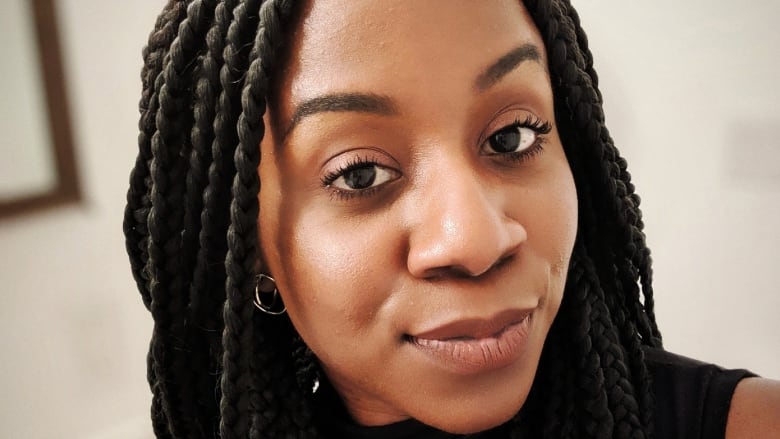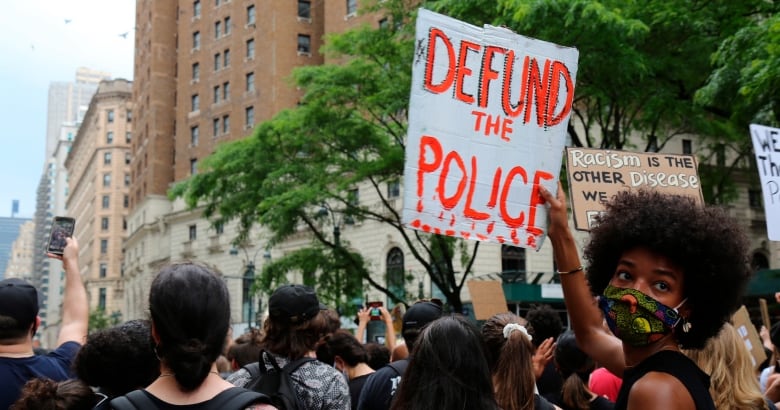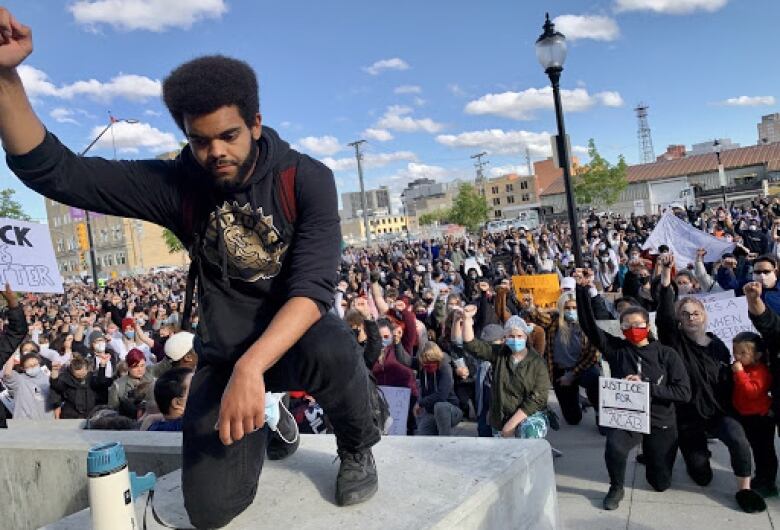Q&A: Founder of Black Lives Matter in Canada explains the call to defund police
'I think that we deserve better in our society,' says Sandy Hudson

Sandy Hudson is a writer and organizer who started Black Lives Matter Toronto and the Black Lives Matter movement presence in Canada. She studieslaw at the University of California Los Angeles and she is the co-editor of and contributortoUntil We Are Free: Reflections on Black Lives Matter in Canada.
Q:Can you explain what it means to defund police?
A:When Black activists are calling for defunding of police, which has become the consensus rallying cry across North America, what we're saying is that there are better services that we can create or that are currently in existence that we can use to provide safety and security for our community in a better way, and certainly in a way that doesn't result in the ridiculous amount of police killings of Black and Indigenous people.
Q. I see comments online from people asking why there are calls to defund police in Canada. They say this country is different to the United States. How do you respond to that?
A: There's a lack of knowledge about how similar the police forces in Canada are to the United States in their interactions with Black people.
For example, where I'm from, Toronto, police are 20 times more likely to kill Black people than non-Black people. The only reason why we don't have that sort of data across Canada is because police departments refuse to collect race-based data. The only reason why we have that data in Toronto is because of a large study done by the Ontario Human Rights Commission.
The way that racism and anti-Blackness often operates in Canada is by denial and through refusal, a refusal to take a look at the information that exists. Also, journalists usually have a really difficult time getting information from police departments that would help to hold them accountable for some of this anti-Black activity and anti-Indigenous activity. We just don't have the rights to that type of information in Canada like they do in the United States.

But just because the police are denying it doesn't mean that it doesn't happen and just because we don't have proper access to information to hold police officers accountable doesn't mean that those things aren't going on.
Even just as this uprising is starting we have seen videos coming out of police officers using similar tactics to the tactics that killed George Floyd in Minneapolis.
We've seen Chantel Moore, who called police in New Brunswick for a wellness check and they shot and killed her.
D'Andre Campbell in Peel Region, a suburb of Toronto, called for mental health support and was shot and killed.
Regis Korchinski-Paquet her mother had called police again for mental health support. Police showed up and she also died.
There was another man named Caleb Njoko. There's just so many names and that's just in the last couple of weeks.
Q: What do you think would be the best way to redirect funding that goes to police now? Would it be better to have a completely new, separate organization for mental health or social workers to respond to mental health calls, or to put funding into services that already exist?
A: I think the best people to ask are the folks who are working in mental health who can really help to create those policies, but I do think absolutely that there needs to be a separate organization that is distinct from police departments that respond to emergency calls that are about mental health crises.
In Oregon there's a program like this already where they have been trying it out in a small city where one in five calls to 911 are redirected to a mental health emergency provider, where the people who show up aren't showing up with lethal force but they are showing up with the health expertise, de-escalation expertise and social supports that people really need. They've found that that program has been so successful that they are now scaling it up for Portland.
I'm living here in Los Angeles, but I grew up in Toronto. I am telling you, the brutalization of Black people and the anti-Blackness that we face, it's not that different.- Sandy Hudson, co-founder of Black Lives Matter in Canada
Imagine calling the police for a family member that you're concerned about, hoping that they are just going to go make sure that your friend, your family member is OK, and then finding out that what they did instead was that they killed them.
They shouldn't be showing up with lethal force. What we need is an emergency response service that is going to provide the mental health support that the people really need and that is not going to show up to kill people.
Q:CBC Saskatchewan asked mayors and police chiefs for Regina and Saskatoon what they think about defunding police. They said that even if they wanted to, they could not put money from the police budget into housing and mental health because those are the jurisdiction of the provincial government. What is your response?
A: It really depends on where you are in Canada it is different from place to place but no of course it's not a valid argument.
Though it may be the purview of the province, that doesn't change the fact that the amount of money across the country that is going into policing leaves little left over for other services.
We hear about defunding other programs all the time. It's when we need to make cuts to education or health care. That is defunding those services.
Police services across Canada consistently don't face cuts. Their budget goes up, and up, and up. We see them get new toys, things like tanks that we don't need.
What would be more helpful from those city politicians is to say something like 'We agree. Our communities need this type of support and so we are signing onto the call and we are asking the province to do what's right, because in our city it would be far more useful to get a budgetary allocation specifically for mental health, or for the province to overall create a service for mental health that is then delivered to the cities, much like police services currently are.'
To try to confuse people by saying 'This is how policy works or this is how the government is set up,' it's like, 'Yeah, we know how the government is set up' and there's a way to accomplish everything we need to accomplish. If there's anything that's taught us that it's the COVID pandemic coronavirus, where we were able to set up different services across Canada at the federal level and provincial level and city level very quickly with these organizations, with these levels of government working together.
That's what we need in this case. Black lives are worth it and Indigenous lives are worth it.
This is about priorities. In this country we need to prioritize Black lives and Indigenous lives who are facing this brutalization consistently by police. It is just really frustrating to hear people who are not from those communities say 'Oh it's not like the United States.' You don't know. We're telling you because we know.
I'm living here in Los Angeles, but I grew up in Toronto. I am telling you, the brutalization of Black people and the anti-Blackness that we face, it's not that different because of the little imaginary line that separates what is called Canada and what is called the United States.
Our cultures are very, very similar. The thing that is very different about Canada is the denial that we are faced with when we tell people outside of Black communities that this is a problem that needs to be addressed.
It's time to stop that denial and it's time to start acknowledging the problem and working on fixing it.
Q: What is the relationship between Black Lives Matter and the Indigenous community in Canada?
A: Everything that we've ever done in Toronto, we've always connected with the Indigenous community nearby because so many of the issues are so, so connected.
If we look at history up to the present, it makes a lot of sense. Police forces, their history, is that they were started in Europe as a way to protect the private property of wealthy men. That private property included people. It included enslaved Black people.
So when settlers came to the new world and set up to build the two countries that we've seen today, the colonization that happened, that role expanded vastly to really protect the property of white folks and in so doing kidnapping Black people who had liberated themselves from enslavement.

Then at the same time that role was expanded to clear the land of Indigenous people, exacting a genocide to create space for white settlers.
We see that kind of history flow through to today, where police officers patrol Indigenous communities and Black communities, and they card Black people and Indigenous people far more than anyone else, and they incarcerate Black people and Indigenous people at disproportionate rates to everybody else. We've never stopped being a community to be controlled and patrolled and surveilled by police forces.
At this point, we've tried all of this reform. It hasn't worked. This is an irredeemable institution that is so connected to some of the most ugly parts of our history and it continues to act in that way today.
Black people and Indigenous people deserve to be safe too and quite frankly this service doesn't provide that for us.
Q: How do you think we got to a point where police are responsible for responding to mental health crises? Why do you think changes to that structure have never been seriously considered in Canada to date?
A: The violence that police officers inflict on Black people and Indigenous people is connected to the history that I just referenced. But with respect to some of the social issues that we have in our society, I think policy makers at some point got really lazy and started to syphon off services to the police force instead of doing what would be harder initially but more beneficial for our communities, which is to create the services that we need.
For example, instead of doing the difficult work of setting up a new emergency service, making sure that the police show up every time that there is a mental health crisis. Instead of dealing with overcrowding in schools, classrooms are too full and we need more counsellors.
Across the country we've started to see police providing services in schools. In one case, in Mississauga in Ontario, a child who was six years old was handcuffed in her classroom.What we really need is the necessary budgetary allocations to provide enough councillors, enough adults in the schools, to provide the supports that these students really need.
With respect to sexual violence or gender-based violence, in this country we know we have a huge crisis with that. Less than 10 per cent of all cases are reported to police and that's partially because of the way police provide a terrible service to people who face gender-based violence.
Instead of creating something new to make sure that people get the supports that they need we still just rely on this service. It's easy during an election cycle to say 'we're going to be tough on crime' and just put a bunch more money into the police.
It sounds good, but we never again get to really see what the results of those budget allocations are. We don't get to see a lot of accountability, measures, numbers. Journalists don't have access to the type of information in Canada that they do in the United States to really scrutinize those budget allocations.
What we're left with is stories from people in the Black community and people in the Indigenous community. We need to believe when we're saying this results in violence for our communities from the police. I just don't think that's anything good for anyone in this country."
Q: Are you hopeful that changes will happen as a result of calls for defunding?
A: I'm very hopeful.
I have never seen so many people all around the world on the streets demanding a change. We are being contacted by activists in Belgium and France, asking for support in creating their own rallies and asking for support in creating their own policy documents. It feels like it's really everywhere.
That does make me quite hopeful, because policy-makers have to know that this is a very, very popular movement. People don't want to stand for the type of anti-Blackness that the police forces inflict on Black people in far too many places in the world.
We're starting to see some politicians in Canada announce their support for the movement to defund the police and for putting more funding into other programs. I'm glad this type of information is finally getting out to the public and people are paying attention.
I'm hopeful that politicians will take note and know that if they want the support of people come next election, they're going to need to do something about this.
Q: Is there anything else that you would like to add?
A: The amount of money in this country spent on policing versus the amount of money spent on services that we need in our communities is staggering.
Right now the federal government alone is spending more than $9 million per day on the RCMP. That's not policing at the provincial level or policing at the municipal level, we're just talking about the RCMP.
Meanwhile, the government had announced mental health support for Black Canadians in 2017 they announced $19 million to be spent over five years.
If you divide that by five that's about $3.8 million per year. So in one day, the amount of money spent on policing in this country is more than is spent in two years on Black Canadians' mental health, just to give you an idea of how exorbitant the costs are for policing.
I think that we deserve better in our society.












_(720p).jpg)


 OFFICIAL HD MUSIC VIDEO.jpg)
.jpg)



























































































